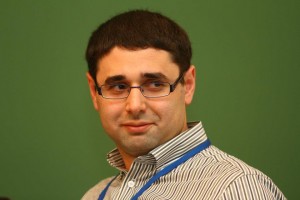Research topic: Сrowdsourcing and emergence of spontaneous order in situations of limited statehood.
I examine the emerging collaborative power of ICT-enabled crowds in crisis situations and aim to investigate the topic drawing on evolutionary theories concerned with spontaneous action and the sustainability of voluntary networked organizations. I analyze whether crowdsourcing practices can lead to development of bottom-up online networked institutions and “peer-to-peer” governance.
Background:
In late July 2010, Western Russia experienced unprecedented wildfires. The government’s emergency response was limited. In many cases Russian Internet users provided the response that was not provided by the authorities. One of the tools that were actively used for coordination of mutual aid was a crowdsourcing platform Ushahidi. An Ushahidi based “Help Map” platform helped to coordinate assistance to victims of wildfires and enabled collective action of online-mediated crowd around specific purpose, namely various aspects of wildfires response actions. Following those events, “Help Map” won a Russian National 2010 Internet Award for best project in the “State and Society” category, proving its significance as a nationally recognized project.
As a co-founder of “Help map” I began thinking about the social and political implications of this type of projects. What was important for me is that ICT can be not only a tool of political protest against particular government/policy, but also a tool of social development and construction. In other words, the communication power of network society can be mobilized not only against traditional institutes and political leaders, but also take another track. In particular, ICT allows crowdsourcing particular functions of government and offering new modes of governance without government.
However, major questions remain unanswered. What are the driving forces of crowdsourcing-based response? Are those types of cases anecdotal, or are they rather the beginning of emerging alternative network-based systems of governance, with some degree of sustainability. If so, how and when can those new network-based modes of governance emerge? These questions motivate and shape my research agenda.
Research framework:
Crowdsourcing, enabled by and mediated through information technologies, has transformed the unstructured resources of a crowd to meaningful and powerful actor that can solve complex specific problems. My PhD research focuses on the role of crowdsourcing in emergence of spontaneous order in situations that range from limited to statehood to anarchy.
The goal of my research is to explore whether the mobilization of crowd resources (mediated through ICT) can have sustainable nature and lead to new, bottom-up institutional form of self-governance and cooperation (“peer-to-peer governance”/ “distribution of governance”). In particular, I am interested in the role of crowdsourcing platforms in crisis/emergency situations (situations that increase the relative degree of anarchy and challenge state actors) and whether it can suggest new modes of governance as a substitute to lack of government-based response.
The key question of my research is what are the driving forces behind ICT-based mobilization of crowd/ collective action, which are forming around a specific purpose, including mechanisms of engagement and mechanisms of the purpose definition. The research makes an effort to bridge between two alternative approaches. The first argues that mobilization of crowds reflects power relations (e.g. network power, control over agenda setting, new type of information elites). The second suggests, that mobilization of crowds can be explained within evolutionary paradigm, and the driving force of online mediated cooperation is a rational will of people to survive in situations when the old state-based institutions fail to provide appropriate response. In the latter case, information technology is not a tool of power, but an instrument that makes possible to coordinate “game strategy” for survival among relatively big group of people (networked crowd/ fifth estate) and translate it to new types of conventions/ norms for collective behavior.
A perspective of social constructivism helps to bridge the gap between the analysis of power relationship and game theory, since it suggest that the concept of rationality and utility can be constructed. Therefore, even if dynamics of cooperation is based on rational assumptions, the question remains of who is able to define the threat and the goal for collective action; what is rational and what is required for survival. Moreover, the degree of cooperation depends on balance of trust between old institutions (states) and new institutions (networks), while the concept of trust is also socially constructed.
The research also addresses long-term consequences of “peer-to-peer” governance and emergence of networked bottom up institutions for traditional political system. It can suggest an alternative to the old system or create a mode of collaboration between the traditional institutes and the networked crowd (hybrid institutes). Crowdsourcing can be exploited, manipulated and restricted by the old institutions.
Research interests:
Crowdsourcing, crisis mapping, Internet and diplomacy, ICT and conflicts, Internet in Russia, ICT and media development, media in Russia, Internet and journalism practices, collaboration between social and traditional media, online identity







